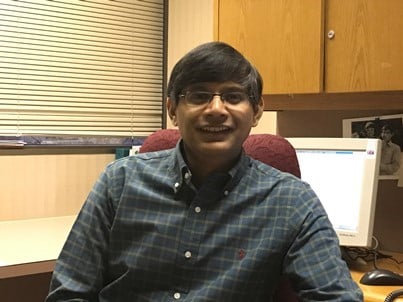Need Help?
13 July 2023
Prof. Dr. Shahid Ahmed Appointed Editor-in-Chief of Current Oncology | Acknowledgement to Prof. Dr. Sharlene Gill
We are pleased to announce that Prof. Dr. Shahid Ahmed has been appointed Editor-in-Chief of Current Oncology (ISSN: 1718-7729). Under Prof. Dr. Ahmed’s stewardship, Current Oncology will continue to provide the best editorial services and contribute to the development of the clinical oncology community.
 |
Name: Prof. Dr. Shahid Ahmed |
Prof. Dr. Shahid Ahmed is a medical oncologist at the Saskatchewan Cancer Agency, Saskatchewan, Canada, and Professor of Oncology at the University of Saskatchewan, Canada. In addition to patient care, he has been actively involved in medical education and research. He has a Ph.D. in community and population health sciences. His research interests include real-world and health service research in gastrointestinal and breast cancer. Prof. Dr. Ahmed holds several research grants and has been actively involved in collaborative research and clinical trials. Furthermore, he has presented his works at several international meetings and published more than 100 articles in peer-reviewed journals.
The following is a short Q&A with Prof. Dr. Shahid Ahmed, who shared his vision for the journal with us, as well as his views on the research area and open access publishing:
1. What appealed to you about the journal that made you want to take on the role as its Editor-in-Chief?
I am honored and enthusiastic to serve as incoming Editor-in-Chief of Current Oncology. Since its establishment in 1994, Current Oncology has been playing an important role in the advancement of cancer care by disseminating new knowledge in the cancer care continuum. Current Oncology is affiliated with several key cancer societies and provides a global platform to share scientific progress in oncology. We strive for high standards and work together to maintain a rigorous and unbiased peer review process to publish high-quality articles. We have an outstanding editorial team which is committed to the success of Current Oncology. I would like to extend my gratitude to our current Editor-in-Chief, Prof. Dr. Sharlene Gill, for her dedication and hard work, along with Editorial Board Members, Section Editors-in-Chief, associate editors, authors, reviewers, and other editorial staff for their ongoing support and commitment in advancement of Current Oncology.
2. What is your vision for the journal?
Current Oncology has established itself as a quality peer-reviewed journal in the oncology community. It has a broad scope and is inclusive in publishing articles in translational, clinical, and real-world evidence in the cancer care continuum. My vision is to increase Current Oncology’s profile in the cancer research community with a rigorous peer review process completed in a timely manner and provide cancer researchers a preferred platform for their high-quality impactful research.
3. What does the future of this field of research look like?
Over the past two decades, with a better understanding of tumor biology and the identification of newer actionable targets, the treatment paradigm for most cancers has changed. However, there remain many challenging areas with unmet needs to improve outcome and reduce the disease burden. For example, in 2023, the 5-year survival of individuals with pancreatic cancer is still about 10%. The members of the global research community are working collectively to generate new cancer knowledge for better outcomes. With the increasing use of molecular biology and cancer genetics in the management of cancer, we anticipate more research focusing on newer validated screening tools for early diagnosis of cancer. The incorporation of artificial intelligence and other digital tools in the use of cancer databases will inform cancer research and further facilitate personalized medicine. We will see increasing use of precision and molecular medicine in tailoring cancer diagnosis, treatment, and prevention, along with a tumor-agnostic approach using various targeted therapies to reduce cancer burden and transform most stage 4 cancers into chronic diseases.
4. What do you think of the development of open access in the publishing field?
Open access to scientific papers is an important step in disseminating research. It improves access to new knowledge for everyone, including researchers and readers from developing countries, and provides opportunities for better collaboration for high-impact research.
Prof. Dr. Shahid Ahmed is taking over from Prof. Dr. Sharlene Gill, the former Editor-in-Chief, who will remain on the Editorial Board of Current Oncology. During the five-year tenure of Prof. Dr. Gill, the journal has had great success, seeing a sustained increase in both the number of publications and the journal’s impact. Prof. Dr. Gill shared with us her experience of serving as the Editor-in-Chief for Current Oncology and expressed her confidence about the future of the journal:
“It has been a pleasure and honor to serve as the Editor-in-Chief for Current Oncology over the past 5 years. I am proud of the journal’s Canadian roots and what it has accomplished as an international platform to disseminate high-quality, peer-reviewed cancer research and review publications. This has been possible due to the efforts of our academic Editorial Board Members and the MDPI editorial team who work diligently to ensure a rigorous and efficient publication process for our authors and readers. Thank you for this wonderful opportunity, and I step down confident that Current Oncology will continue to excel under the leadership of Prof. Dr. Shahid Ahmed as our incoming Editor-in-Chief.”
We are extremely grateful to Prof. Dr. Sharlene Gill for her hard work and support in helping the journal realize its potential, and warmly welcome Prof. Dr. Shahid Ahmed as the new Editor-in-Chief. We look forward to his contribution and to the continued success of Current Oncology.

